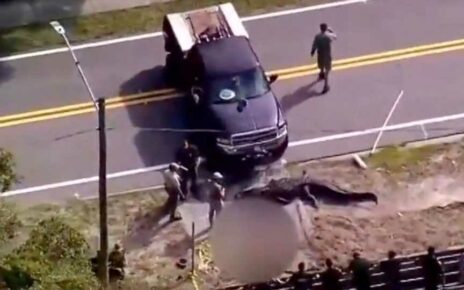CHILLING CCTV footage captured the moment two trains catastrophically collided in Greece, killing at least 38 people.
A huge fireball exploded in the night sky as a 1,300C blaze began to erupt while passengers were trapped in the wreckage.




Survivors told of the "ten seconds of terror" as a passenger express slammed head-on into a freight train late on Tuesday.
The terrifying surveillance footage has given further insight into the torment people faced as they were stuck in derailed carriages.
Flames shot hundreds of feet into the air just seconds after the impact, sparking a deadly blaze.
The death toll has now risen to 38, as the fire department said another 57 people were hospitalised with horror injuries.
READ MORE ON GREECE

Caroline Crouch’s dad hits out at killer & blasts his sentence appeal

Woman stunned by ‘secret’ hotel bathroom door during Greek holiday
At least six of those are in intensive care – while several other passengers are still missing.
The passenger train, packed with some 342 passengers and ten crew members, was heading to Thessaloniki in the north from the capital of Athens when the tragedy unfolded.
It had just left Larisa in central Greece when it ploughed head-on into a goods train heading in the opposite direction just before midnight.
The force of the smash is understood to have been so powerful that it "pulverised" the front cars of both trains.
Most read in The Sun

Strictly star bags life-changing EastEnders role as part of new family

Baby's body found after huge search as cops quiz Constance Marten & lover

I took pic of son, 18, before his first night out… then the worst thing happened

Meg & Harry 'stunned' by King's 'cruel' Frogmore eviction 'punishment'
At least three carriages burst into flames, while the wreckages snaked off the train tracks and onto adjacent fields.
Panicking passengers kicked through windows to escape the horror unfolding, as temperatures quickly reached 1,300C as the inferno engulfed the carriages.
Others were thrown up to 40metres out of their seats on impact.
Mangled carriages with broken windows lay twisted beside the tracks as thick plumes of smoke rose into the sky.
Rescue workers were seen frantically looking for survivors in the debris on Wednesday, as many were believed to be still trapped.
Police arrested the station master at Larisa – who was allegedly in charge of signalling on that stretch.
He was charged with causing mass deaths and grievous bodily harm through negligence, a police official said.
The 59-year-old is said to deny wrongdoing and blamed a technical failure.
A railway union boss said automatic signals at the spot were not working.
Greek Prime Minister Kyriakos Mitsotakis said in a televised address: "Everything shows that the drama was, sadly, mainly due to a tragic human error.
He described the tragedy as a "terrible train accident without precedent" in Greece which would be "fully" investigated.
The country's transport minister Kostas Karamanlis has resigned in wake of the incident, saying he felt it was his duty and a "sign of respect" to the victims.



Most of the dead were young people in their 20s, said Apostolos Komnos, head of the local hospital emergency unit.
Many passengers were university students returning home after carnival celebrations over the long holiday weekend.
Volunteer fireman Vassilis Iliopoulos said some victims were being identified from body parts.
Police have collected 17 biological samples from remains and 23 from relatives desperately trying to locate their loved ones.
Survivor Stergios Minenis, 28, told how he jumped to safety as the flames continued to grow.
He said: "We heard a big bang, (it was) ten nightmarish seconds.
There was panic… the fire was immediate, as we were turning over we were being burned, fire was right and left.
"Windows were being smashed and people were screaming."
Another passenger who managed to escape from the fifth carriage recalled how one window "caved in from the impact of iron from the other train."
Pavlos Aslanidis, whose son is missing along with a friend, told reporters "it was the train of terror."
Another passenger told Skai TV: "There was panic in the carriage, people were screaming," while another one described the crash as "an earthquake."
Shocking footage from the scene showed the glow of the fire spreading across the wreckage in the darkness overnight.
'A TERRIBLE NIGHT'
Witnesses described plumes of black smoke as emergency workers desperately tried to reach those on board.
One passenger said he managed to escape after breaking the train window with his suitcase.
The Regional Governor of Thessaly told ERT: "Wagons 1 and 2 do not exist. Due to the severity of the collision, they were ejected."
About 250 passengers were evacuated safely to Thessaloniki on buses.
Firefighters battled to douse the blaze in the early hours of Wednesday morning while searching for survivors.
The armed forces were also called in to assist in the rescue effort, as emergency workers from nearby towns rallied to free those still stuck in the wreckage.
“The evacuation process is ongoing and is being carried out under very difficult conditions due to the severity of the collision between the two trains,” Fire Service spokesman Vassilis Varthakoyiannis said.
The nearby city of Larisa was placed on emergency duty while locals pull together amid the train tragedy.
Some 150 firefighters rushed to the scene as 30 ambulances ferried multiple casualties to nearby hospitals.
Larisa mayor Apostolos Kalogiannis said officials are still trying to determine what happened.
“It was a very powerful collision. This is a terrible night… It’s hard to describe the scene,” Kostas Agorastos, the regional governor of the central Thessaly area, told state-run television.
Prime Minister Kyriakos Mitsotakis has suspended his schedule after being informed of the crash.
Read More on The Sun

Art Attack’s Neil Buchanan unrecognisable after quitting TV for rock band

New winter sun hotspot 5 hours from UK with 27C heat where TUI is launching hols
He has declared three days of national mourning in memory of the victims.
Military hospitals in Athens and Thessaloniki were put on alert should they need to receive any further wounded.




Source: Read Full Article

